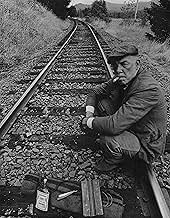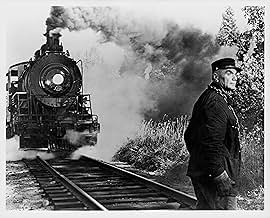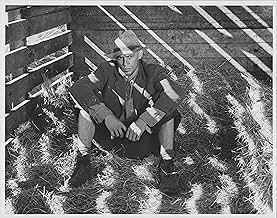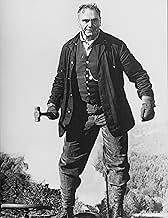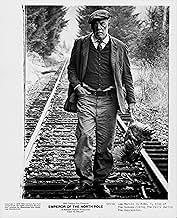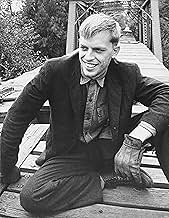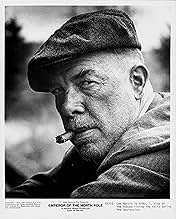अपनी भाषा में प्लॉट जोड़ेंIn 1933, during the Depression, Shack the brutal conductor of the number 19 train has a personal vendetta against the best train hopping hobo tramp in the Northwest, A No. 1.In 1933, during the Depression, Shack the brutal conductor of the number 19 train has a personal vendetta against the best train hopping hobo tramp in the Northwest, A No. 1.In 1933, during the Depression, Shack the brutal conductor of the number 19 train has a personal vendetta against the best train hopping hobo tramp in the Northwest, A No. 1.
- Gray Cat
- (as Elisha Cook)
- Dinger
- (as Joe di Reda)
- Fakir
- (as James Goodwin)
- Preacher
- (as Ray Guth)
कहानी
क्या आपको पता है
- ट्रिवियाThe title refers to a joke among hobos during the Great Depression that the world's best hobo was Emperor of the North Pole, a way of poking fun at their own desperate situation since somebody ruling over the North Pole would be ruling over a wasteland.
- गूफ़The switch is not thrown for the mail express train to pass by Shack's train as it just enters the junction. In those days, not having the switch thrown would have derailed the mail train.
- भाव
A no. 1: [At the end of the movie, A No. 1 throws Cigaret off of the train, into a pond, and shouts to him from the train] Hey kid you got no class. Hit the bums, kid. Run like the devil. Get a tin can and take up mooching. Knock on back doors for a nickel.
A no. 1: Tell them your story. Make 'em weep. You could have been a meat-eater, kid. But you didn't listen to me when I laid it down.
A no. 1: Stay off the tracks. Forget it. Its a bum's world for a bum. You'll never be Emperor of the North Pole, kid. You had the juice, kid, but not the heart and they go together. You're all gas and no feel, and nobody can teach you that, not even A-No.1. So stay off the train, she'll throw you under for sure. Remember me for that. So long, kid.
- इसके अलावा अन्य वर्जनOriginally premiered as "Emperor of the North Pole": the film was pulled from release because people thought the film was about the Arctic. It was re-released as "Emperor of the North" and given two different advertising campaigns: one with a poster playing up the comedy, another with a poster playing up the violence (The poster said "If you can ride Shack's train and live, you're...Emperor of the North!"). Neither new campaign clicked with audiences. The song "A Man and a Train" is sung in "Emperor of the North" by Marty Robbins. The poster for the original release says it is sung by Bill Medley. It is unknown what other changes, if any, were made between the two releases.
It's a classical subculture in that it has all the features of a closed world with its own values. Everyone seems to know everyone else. And, as in most subcultures, including those that used to be called "primitive societies," the initiate is given a new name. In other movies exploring such subcultures they may have names like "Fast Eddy," "Minnesota Fats," "Maverick," "Dragstrip," "Charlie the Gent." Here they have names like "A Number 1" (Lee Marvin), "Cigaret" (Keith Carradine), and "Shack" (Borgnine). They even had their own written language, a set of pictographs scratched into rocks or written in dirt, conveying messages like, "This family good for a free meal," or , "Work for a meal," or, "Stay away. Cops." There were small communities of hobos, often carved out of track-side garbage dumps.
Interesting cast, by the way, a lot of familiar faces in bit parts -- Simon Oakland, Elija Cook Jr.
Makeup and Wardrobe Departments have done a fine job of turning them into 'Bos. They don't look Hollywood dirty, with a few smears of mud. They just look dirty. Their clothing is filthy. All in all, a good delousing looks called for. Marvin's face, by the time this was released, looked just beat-up enough, and from life, not booze. And check out his decaying lower incisors.
The plot has to do with a duel of wits between Marvin, who is determined to demonstrate his skill at the top of the status ziggurat by riding Borgnine's train to Porland, OR. Borgnine, much to the puzzlement of the rest of the train crew, is obsessed with keeping his freight train clean of hitch-hikers. He's fiendishly clever in smoking out and hurting riders. Carradine is the kind of youth often called "callow." He brags a lot and is brave but, alas, is unable to absorb the rules of the game because he plays for reasons of self aggrandizement, not for the team. He winds up in the drink.
There's something else about this movie that may keep a viewer interested. It takes place during the depression. The trains are slow, fed by coal, and powered by steam. They rock back and forth gently, as if trying to put a passenger or a stowaway to sleep. And they travel through a sunny evergreen wilderness in the Northwest. It's the kind of scenic journey you now have to pay for if you want to make a round trip to San Juan, CO. What was in the 1930s essential to a certain kind of existence has now been vulgarized and turned into a tourist's delight.
It's a small story about small people. There is nothing epic about it. The score seems to owe something to Burt Bacharach, who was so successful a few years earlier with "Butch Cassidy and the Sundance Kid." And, for my taste, there are one or two too many choker close-ups filling the screen with monstrous teeth and sweaty flesh. But it's hard to ignore the movie. You'll probably want to find out what happens next.
- rmax304823
- 11 सित॰ 2003
- परमालिंक
टॉप पसंद
- How long is Emperor of the North?Alexa द्वारा संचालित
विवरण
बॉक्स ऑफ़िस
- बजट
- $37,05,000(अनुमानित)
- चलने की अवधि1 घंटा 58 मिनट
- रंग
- पक्ष अनुपात
- 1.85 : 1
इस पेज में योगदान दें



